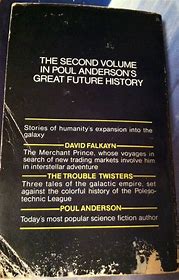When Falkayn tells Stepha that the human discoverers of the planet Cynthia had named it after their captain's wife, Chee murmurs that she had heard that that woman was not exactly the captain's wife:
"Falkayn blushed again and stole a glance at Stepha. But she didn't look embarrassed; and considering those cusswords she'd ripped out -" (pp. 93-94)
"The Trouble Twisters" was published in 1965 yet Falkayn, a man of the world, is embarrassed when Stepha swears and again when Chee mentions a space captain's mistress in front of Stepha? However, what matters is the social mores not in the year of publication but in Falkayn's future social milieu. We see social changes in two generations between Nicholas van Rijn and his granddaughter, Coya Conyon.
In another timeline, a Time Patrol agent, who should know more than anyone else about social change, comments on the 1960s and 1970s:

3 comments:
Kaor, Paul!
And I recall either Manse or am omnipotent narrator dismissing the upheavals of our 1960's and 1970's as mere bubble pops compared to far vaster socio/economic chaos in the future.
Ad astra! Sean
The humans on Ikhrana are also more recently from Terra than he is; probably there are differences in mores.
Mind you, the five hundred or so stranded there by the pirates sound as if they were from some rural backwater on Earth (possibly the Ozarks) and left because they didn't like the way Earth was developing.
Kaor, Mr. Stirling!
The "Ershoka" stranded on Ikrananka were lucky the pirates didn't simply massacre them out of hand!
I agree, as would Anderson. It was his belief, given practical space travel, within or outside the Solar System, that many would leave Earth if they could because of dislike of what it was turning into. For social, religious, political, ethnic, etc., reasons.
Ad astra! Sean
Post a Comment